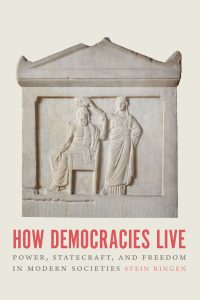Five Questions with Stein Ringen, author of “How Democracies Live”
Time has not been kind to democracy. How Democracies Live is in its defense. We spoke with the author, Stein Ringen, to hear a little more about the inspiration for this book, some of his research experiences, and the plans for his next project.
How did you become interested in power, statecraft, and freedom in modern societies? What led you to write about it?
I am a Scandinavian and we Scandinavians have had the good luck of seeing state power work well for us. State power comes with both potentials and risks. By and large, we have benefitted from the potentials and avoided the risks. That’s a bit of a miracle. I have wanted to understand how that can come about.
Part of my career has been in high public office. In that experience, I have seen how terribly difficult it is to make good policy and to get it to work. I’ve been exploring it for forty years, from my early research into the welfare state.
When I say that state power works well (or poorly), I have in mind not only the mechanics of public policy but also the underlying culture. The Scandinavians have pretty much avoided the slide into polarization and culture wars that we have seen in some other places. People trust each other and have trust in their governments.
The great Robert Dahl said it thus: “The prospects for stable democracy are improved if the country possesses a democratic political culture,” and added: “Lucky the country whose history has led to these happy results!” He was right – but it’s not only luck. Governments have trust when they deliver and can deliver when they are trusted.
Can you comment a bit on the culture around democracy in the United States today?
America has everything going for it. A strong economy with next to unlimited capacity. The melting pot tradition to which diverse peoples contribute. Cultural vivacity.
But somehow, Americans are unable to appreciate their luck. I’m not surprised that there is disagreement and conflict. There is much to be unhappy about: inequality, exclusion, racism. But I’m still surprised at the anger that now pervades social life,and I find it disturbing how anger seems to be stoked from all sides, by liberals and conservatives alike. Everyone demands rights for themselves and wants duties left to others.
We must hope that Americans will be more able to get together and say to each other, “Let’s deal with these problems.” That would depend on the ability of everyone to be more accepting of duties and less fundamentalist on rights. Bringing that about would be a matter of dealing with runaway inequality and persistent poverty. Governments need to deliver. If they do, there will be trust.
While working on the book, what did you learn that surprised you the most?
My investigation of power took me to where I had not expected, to the deflation of the power of power. We easily think that power gets things done: if you have power, you can dominate others, impose your will, and make things happen. Not so, I found. I compare holding power to having a driving license: “No more than a driving license says how good a driver the holder is, does power say how good a governor its winner will be.”
I draw a sharp line between power and the use of power and find that it is not power itself, but the way it is used, that explains its influence in the world. That again leads me to the analysis of statecraft and leadership, in the case of government to the quality of leadership.
I was also surprised that political science, the science of power, has failed to find a robust definition of its core concept. Understanding power is at the heart of any political analysis. We therefore obviously need a clear understanding of the meaning of power and how it works. Building on the distinction between power and the use of power, I think I’ve been able to find the missing definition.
What do you most hope people take away from your book?
That it is a passionate defense of democracy. I consider in detail the reasons why we should hold on to and take care of democratic government and find those reasons compelling. The idea that we citizens govern ourselves is one of humanity’s greatest inventions. “My defense of democracy,” I write, “grows out of a conviction that if we and our children cannot live under reasonably well-functioning democratic rule, our and their lives will suffer for it. It is not a book of predictions of doom and gloom, but a reminder, a sober reminder I hope, of the majesty, albeit imperfect majesty, of the democratic enterprise.”
Where will your research and writing take you next?
I am finishing a History of Scandinavia, three countries (Denmark, Norway, and Sweden), 1200 years, to be published next year. It’s a dramatic story of persistent warfare, exploitation, and misery which has nevertheless brought us to the harmony we today associate with brand Scandinavia. It’s in part the story of those peoples and in part a European history as seen from up north.
Stein Ringen is emeritus professor at Green Templeton College, University of Oxford and visiting professor of political economy at King’s College, London.
How Democracies Live is available now from our website or your favorite bookseller.
